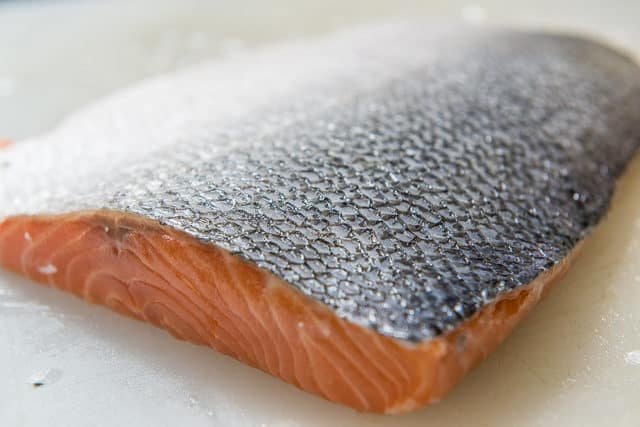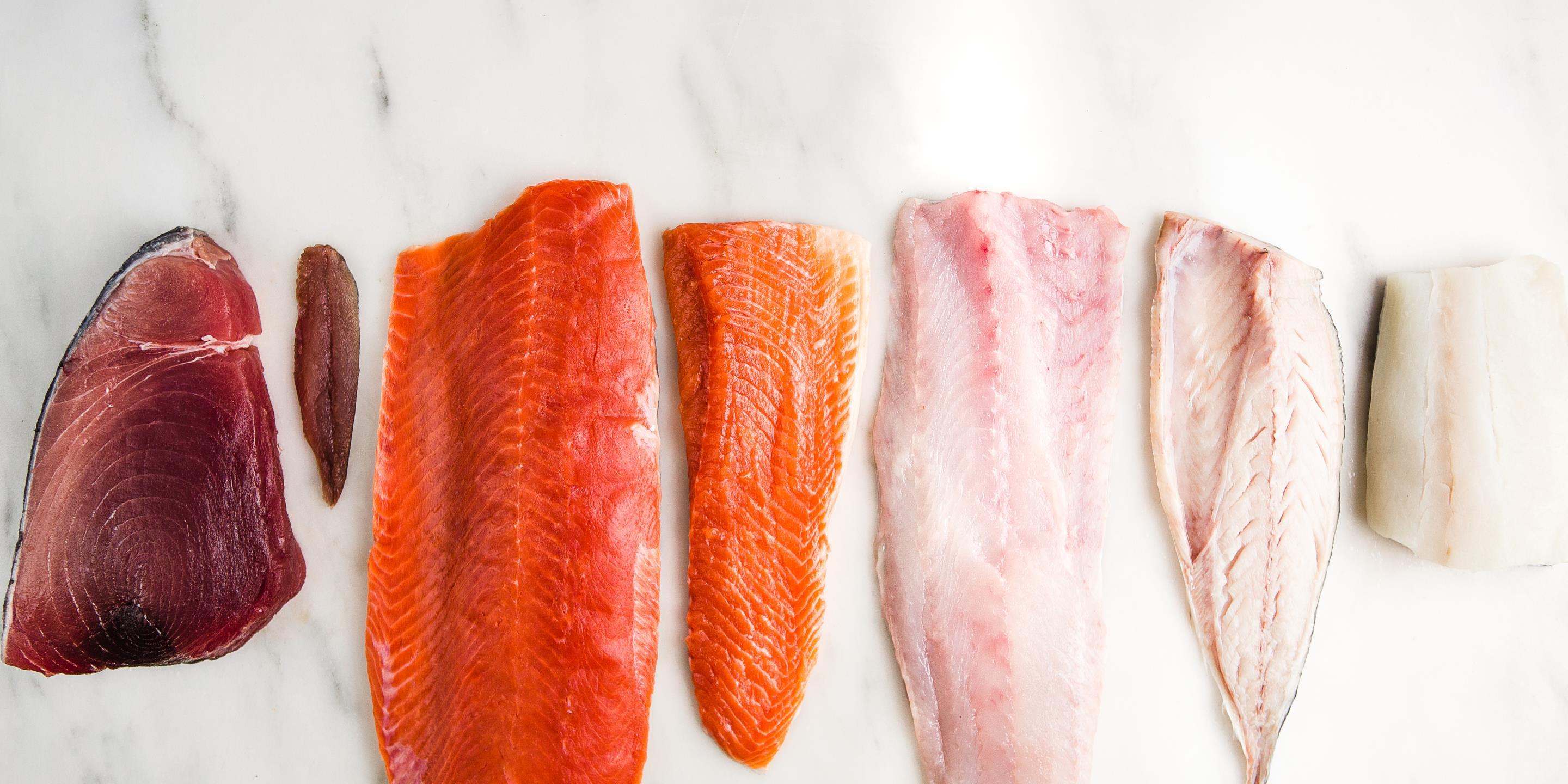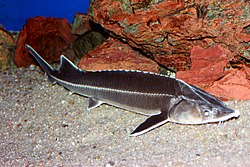BS”D
Shiur Sukkah 18a – Pesach – 03/02/21
1- We continued with the Sugya of לבוד, if this הלכה למשה מסיני applies to gaps in a roof of a house and a Sukkah as well as to gaps in walls. Meaning, do we bridge empty spaces, less than 3 טפחים, horizontally as well as vertically.
2- Discussed the novel explanation of the ערוך לנר and his connection to the Gemara in בבא בתרא about what is considered ‘an average sized house’.

3- The Gemare talks about the issue of eating small kosher fish אברומה from a river that has also inhabits non kosher insects/fish.
Bream – אברומה?
The concern is that the non-kosher species occasionally mix or attach to the kosher ones.
4- We discussed the Halachah requiring one to ensure when purchasing fish that at least part of the skin (identifying it as skin that has or had scales) still be attached to the fillet.

Also touched on the topic if the color of the fish is sufficient to identify it as kosher. Such as the (non dyed) pink color of salmon. Some claim that no other fish has this color while others dispute it.

(Parenthetically, I once saw pink/orange non kosher fish at a fish market in the Caribbean. Perhaps they were dyed).

4- We spoke about the fish called ‘stincus marinus’ (scincus marinus). This fish was a topic we came across when we learnt מסכת עבודה זרה.

The issue is the Gemore says that all kosher fish have scales and also have fins. (As opposed to non-kosher fish that have only fins or no fins at all).
When fishermen found this ‘stincus marinus’ in the Mediterranean with scales but no fins, there was much discussion on this phenomenon which seemed contrary to the Gemore.
As discussed then, some experts claimed that this fish did indeed have tiny fins. Others simply said that the Gemara’s rule was not that 100% of all kosher fish have scales have fins, but the majority have. See here, from HaKsav veHakabbalah, written by Rabbi Ya’akov Zvi Mecklenburg :

5- We discussed the controversy in the 1780s regarding two types of fish, Shteril and Tik, – שטירל or טיק – that had scales indeed, but were difficult to peel off the skin. The rule is that scales must be able to be peeled off without ripping the skin under them.
German Jews ate them as opposed to Jews from Hungary.
After inspecting the fish and successfully peeling off the scales, the Noda Biyehuda wrote that it is a kosher fish.
“ולכן ידע שדג זה ששלח לכאן טהור הוא בלי ספק כלל”
However, a dispute arose as to the identity of the fish type that was presented to the Noda Biyuhuda.
Many publications were printed with each side claiming to be correct. See here one publication claiming that the Noda Biyehuda changed his mind.

5- The sturgeon fish appears in fact to be the שטירל – Shteril.

The whole story is told here.
6- With less than a month to Pesach, which begins this year on a Sunday, we read the text of the Gemore in פסחים concerning an ערב פסח that happened to fall on Shabbos and the issue it brought up.
We will IYH continue on this amazing story in the next few shiurim.
פסחים סו,א.
ְּתָּנוּ רַבָּנַן: הֲלָכָה זוֹ נִתְעַלְּמָה מִבְּנֵי בְתִירָא. פַּעַם אַחַת חָל אַרְבָּעָה עָשָׂר לִהְיוֹת בְּשַׁבָּת, שָׁכְחוּ וְלֹא יָדְעוּ אִם פֶּסַח דּוֹחֶה אֶת הַשַּׁבָּת אִם לאו.
GEMARA: The Sages taught a baraita with regard to the basic halakha governing the eve of Passover that occurs on Shabbat: This law was forgotten by the sons of Beteira, who were the leaders of their generation. The fourteenth of Nisan once occurred on Shabbat, and they forgot and did not know whether the Pesach lamb overrides Shabbat or not.
. אָמְרוּ: כְּלוּם יֵשׁ אָדָם שֶׁיּוֹדֵעַ אִם פֶּסַח דּוֹחֶה אֶת הַשַּׁבָּת אִם לָאו? אָמְרוּ לָהֶם: אָדָם אֶחָד יֵשׁ שֶׁעָלָה מִבָּבֶל וְהִלֵּל הַבַּבְלִי שְׁמוֹ, שֶׁשִּׁימֵּשׁ שְׁנֵי גְּדוֹלֵי הַדּוֹר שְׁמַעְיָה וְאַבְטַלְיוֹן, וְיוֹדֵעַ אִם פֶּסַח דּוֹחֶה אֶת הַשַּׁבָּת אִם לָאו. שָׁלְחוּ וְקָרְאוּ לוֹ,
They said: Is there any person who knows whether the Pesach lamb overrides Shabbat or not? They said to them: There is a certain man in Jerusalem who came up from Babylonia, and Hillel the Babylonian is his name. At one point, he served the two most eminent scholars of the generation, Shemaya and Avtalyon, and he certainly knows whether the Pesach lamb overrides Shabbat or not. The sons of Beteira sent messengers and called for him.
אָמְרוּ לוֹ: כְּלוּם אַתָּה יוֹדֵעַ אִם הַפֶּסַח דּוֹחֶה אֶת הַשַּׁבָּת אִם לָאו? אָמַר לָהֶם: וְכִי פֶּסַח אֶחָד יֵשׁ לָנוּ בַּשָּׁנָה שֶׁדּוֹחֶה אֶת הַשַּׁבָּת? וַהֲלֹא הַרְבֵּה יוֹתֵר מִמָּאתַיִם פְּסָחִים יֵשׁ לָנוּ בַּשָּׁנָה שֶׁדּוֹחִין אֶת הַשַּׁבָּת
They said to him: Do you know whether the Pesach lamb overrides Shabbat or not? He said to them: Have we but one Pesach lamb during the year that overrides Shabbat? Do we not have many more than two hundred Pesach lambs, i.e., sacrifices, during the year that override Shabbat?
אָמְרוּ לוֹ: מִנַּיִן לְךָ? אָמַר לָהֶם: נֶאֱמַר ״מוֹעֲדוֹ״ בַּפֶּסַח, וְנֶאֱמַר ״מוֹעֲדוֹ״ בַּתָּמִיד: מָה ״מוֹעֲדוֹ״ הָאָמוּר בַּתָּמִיד דּוֹחֶה אֶת הַשַּׁבָּת, אַף ״מוֹעֲדוֹ״ הָאָמוּר בַּפֶּסַח דּוֹחֶה אֶת הַשַּׁבָּת.
They said to him: From where do you know this? He said to them: “Its appointed time” is stated with regard to the Pesach lamb and “its appointed time” is also stated with regard to the daily offering, for the verse says: “Command the children of Israel and say to them, My offering, the provision of My sacrifice made with fire, for a sweet savor to Me, shall you observe to offer Me at its appointed time” (Numbers 28:2). From here we learn that the daily offering is brought even on Shabbat. Thus, the daily morning and afternoon offerings are brought on more than fifty Shabbatot over the course of the year, and two sheep are offered every Shabbat as additional offerings, for a total of more than two hundred sacrifices a year that override Shabbat. Just as the expression “its appointed time,” which is stated with regard to the daily offering, indicates that it overrides Shabbat, so too “its appointed time,” which is stated with regard to the Pesach lamb, indicates that it overrides Shabbat.
וְעוֹד, קַל וָחוֹמֶר הוּא: וּמָה תָּמִיד שֶׁאֵין עָנוּשׁ כָּרֵת דּוֹחֶה אֶת הַשַּׁבָּת, פֶּסַח שֶׁעָנוּשׁ כָּרֵת — אֵינוֹ דִּין שֶׁדּוֹחֶה אֶת הַשַּׁבָּת.
And furthermore, it is a קל וחומר inference: If the daily offering, the neglect of which is not punishable by karet, overrides Shabbat, is it not right that the Pesach lamb, the neglect of which is punishable by karet, should override Shabbat?
מִיָּד הוֹשִׁיבוּהוּ בָּרֹאשׁ, וּמִינּוּהוּ נָשִׂיא עֲלֵיהֶם, וְהָיָה דּוֹרֵשׁ כׇּל הַיּוֹם כּוּלּוֹ בְּהִלְכוֹת הַפֶּסַח. הִתְחִיל מְקַנְטְרָן בִּדְבָרִים. אָמַר לָהֶן: מִי גָּרַם לָכֶם שֶׁאֶעְלֶה מִבָּבֶל וְאֶהְיֶה נָשִׂיא עֲלֵיכֶם — עַצְלוּת שֶׁהָיְתָה בָּכֶם, שֶׁלֹּא שִׁמַּשְׁתֶּם שְׁנֵי גְּדוֹלֵי הַדּוֹר, שְׁמַעְיָה וְאַבְטַלְיוֹן.
After Hillel brought these proofs, they immediately seated him at the head and appointed him Nasi over them, and he expounded the laws of Passover that entire day. In the course of his teaching, he began rebuking them [mekanteran] them with words. He said to them: What caused this to happen to you, that I should come up from Babylonia and become Nasi over you? It was the laziness in you that you did not serve the two most eminent scholars of the generation living in Eretz Yisrael, Shemaya and Avtalyon.
אָמְרוּ לוֹ: רַבִּי, שָׁכַח וְלֹא הֵבִיא סַכִּין מֵעֶרֶב שַׁבָּת, מַהוּ? אָמַר לָהֶן: הֲלָכָה זוֹ שָׁמַעְתִּי וְשָׁכַחְתִּי, אֶלָּא הַנַּח לָהֶן לְיִשְׂרָאֵל, אִם אֵין נְבִיאִים הֵן — בְּנֵי נְבִיאִים הֵן.
They said to Hillel: Our teacher, if one forgot and did not bring a knife on the eve of Shabbat and cannot slaughter his Paschal lamb, what is the law? Since he could have brought the knife before Shabbat, he cannot bring it on Shabbat; but what should he do in this situation? He said to them: I once heard this halakha from my teachers but I have forgotten it. But leave it to the Jewish people; if they are not prophets to whom God has revealed His secrets, they are the sons of prophets, and will certainly do the right thing on their own.
לְמָחָר, מִי שֶׁפִּסְחוֹ טָלֶה — תּוֹחֲבוֹ בְּצַמְרוֹ, מִי שֶׁפִּסְחוֹ גְּדִי — תּוֹחֲבוֹ בֵּין קַרְנָיו. רָאָה מַעֲשֶׂה וְנִזְכַּר הֲלָכָה, וְאָמַר: כָּךְ מְקוּבְּלַנִי מִפִּי שְׁמַעְיָה וְאַבְטַלְיוֹן.
The next day, on Shabbat that was the eve of Passover, one whose Pesach offering was a lamb took the knife and stuck it in its wool; and one whose Pesach offering was a goat, which does not have wool, stuck it between its horns. Hillel saw the incident and remembered the halakha that he had once learned and said: This is the tradition I received from the mouths of Shemaya and Avtalyon, meaning that this is in fact the proper course of action.

